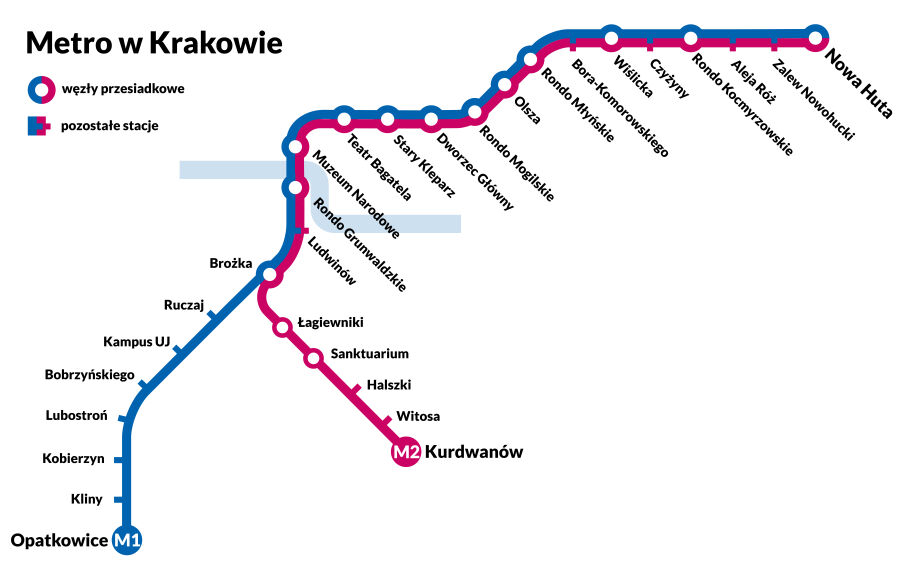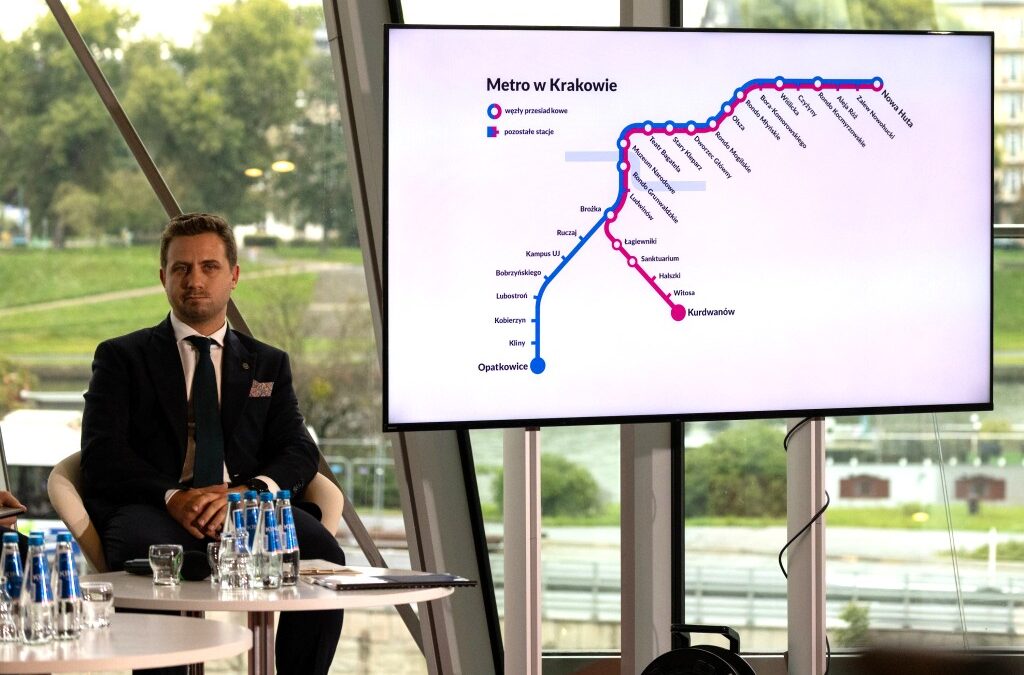Keep our news free from ads and paywalls by making a donation to support our work!

Notes from Poland is run by a small editorial team and is published by an independent, non-profit foundation that is funded through donations from our readers. We cannot do what we do without your support.
Kraków, Poland’s second-largest city, has unveiled the route of the metro system it is planning to build – and which would be only the second in the country.
The idea of building a metro in Kraków has been discussed for decades and, in 2014, 55% of residents who took part in a referendum voted in favour of the project. However, only last year did the city’s newly elected mayor, Aleksander Miszalski, announce plans to do so.
On Wednesday, he unveiled the intended route of the system, which will consist of two lines stretching over 29 kilometres in total and passing through 29 stations. The city hopes to begin construction in 2030, with the system finished by 2035.
#Krakow #KrakowskieMetro #MetroWKrakowie #JakPojedzieMetro #WDobrymKierunku
Którędy pojedzie krakowskie metro? Rekomendowany przebieg dwóch linii – M1 i M2 – ma prawie 29 kilometrów. Zaplanowano 29 stacji, w których zasięgu znajdzie się niemal 40 proc. mieszkańców. To będzie… pic.twitter.com/sH0PIus13y— Kraków (@krakow_pl) September 24, 2025
The metro will run mostly underground through residential areas and the city centre – though it skirts around Kraków’s Old Town, which is a UNESCO World Heritage site and contains many historical structures.
Both of the metro’s two lines, M1 and M2, would begin in Nowa Huta in east Kraków before heading westwards through the main train station and into the city centre, where stops would include Bagatela Theatre and the National Museum.
From there, both lines would turn south, passing through the Dębniki district before separating at Brożka Street. M1 would then continue southwest, terminating at Opatkowice on the southern edge of the city. M2 would go southeast, terminating in Kurdwanów, another large residential district.
City hall estimates that 40% of Kraków’s population – which currently stands at just over 800,000 – would live within a ten-minute walk of a metro station once the system is complete. It forecasts that almost 300,000 people will use the metro each day.

Meanwhile, the system will significantly cut travel times – for example, from 40 minutes to 26 minutes for the journey from Nowa Huta to the National Museum – according to the city’s calculations.
The planned route of the metro will intersect with existing tram lines in 11 places and with current or planned overground rail stations in five places, helping to integrate it into the broader public transport system. New park-and-ride facilities will also be built.
Deputy mayor Stanisław Mazur notes that the metro system will also be designed to enhance security for residents of the city by having stations and tunnels that can function as emergency shelters.
Kraków has been named Europe's best city break destination by members of @WhichUK.
The city's food and drink was rated as better than in Paris and Rome, while it also scored top marks for accommodation, ease of getting around and value for money https://t.co/U1P1QkQCm4
— Notes from Poland 🇵🇱 (@notesfrompoland) September 19, 2025
The estimated cost of the project is 13-15 billion zloty (€3-3.5 billion), reports financial news website Money.pl. The city said today that it would seek both national and European Union funds to support construction, as well as loans from international financial institutions.
Poland’s only other metro system, in Warsaw, opened in 1995. Its second line was added in 2015, with a third line planned. Last year, Warsaw’s mayor, Rafał Trzaskowski, approved funds for “pre-design” work on a fourth line.
Łódź, Poland’s fourth-largest city, is currently building a major underground rail tunnel that is often informally referred to as a “metro”. However, it will operate as an extension of the existing overground rail network rather than as a metro system.
Warsaw has opened an underground library at one of its metro stations, the first facility of its kind in Poland.
Metroteka – a play on the Polish word for library, “biblioteka” – offers commuters over 16,000 books to borrow https://t.co/zR6BLIa3C9
— Notes from Poland 🇵🇱 (@notesfrompoland) September 7, 2025

Notes from Poland is run by a small editorial team and published by an independent, non-profit foundation that is funded through donations from our readers. We cannot do what we do without your support.
Image credits: Krakow.pl

Daniel Tilles is editor-in-chief of Notes from Poland. He has written on Polish affairs for a wide range of publications, including Foreign Policy, POLITICO Europe, EUobserver and Dziennik Gazeta Prawna.



















